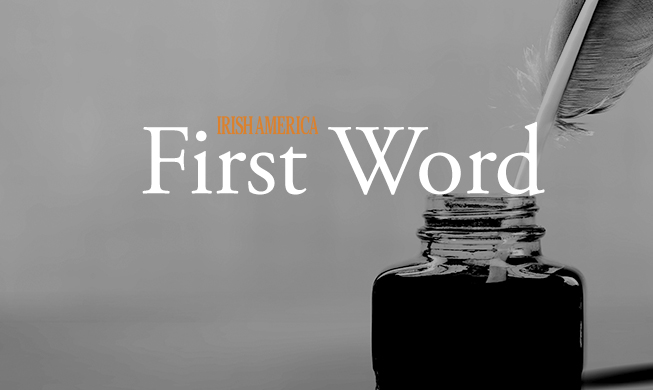
This, the last ‘Top 100′ for this millennium, shows that at the turn of the century the Irish in America have reached heights of success surely unimagined by those impoverished immigrants who crossed the Atlantic to seek a new life in the last century
Was it even conceivable that a group of people who were told they `need not apply’ would today be the ones doing the hiring? Yet, here are Irish American stories of influence in every aspect of American life.
With so many accomplished individuals to choose from it was an extremely difficult task to pick just 100, so we set ourselves the goal of choosing those who best represent the broader story of the Irish in America. If in another hundred years, some student of history comes across this issue in the archives we hope the list will offer an intriguing look at what Irish Americans have achieved in the countdown to the year 2000.
In reading Annmarie Acosta’s profile, for instance, our student from the future will know that the music which traveled in the hearts of those early immigrants survived. And as that student marvels at the fact that a Puerto Rican Irish New Yorker placed first in a prestigious Irish music competition, perhaps he or she will also reflect on how the Irish in America mingled with other ethnic groups, as the music itself influenced the blues and American folk music and the country music of mega-star Garth Brooks, who takes pride in his Irish roots.
The extraordinary ability of our race to overcome and survive against the odds is evident in the true grit and determination of an Aimee Mullins striding so confidently down a London catwalk that most of those watching were unaware that she is a double amputee.
Mike Sullivan’s story — from his pioneering immigrant ancestry of the last century to his return home as American Ambassador — says much of the relationship between the Irish and this country, which provided the freedom and room to grow and succeed.
The history of Irish activism is reflected in Monsignor Charles Owen Rice, as it is in John Cronin, who was instrumental in cleaning up the Hudson, one of our proudest rivers.
And how can one read of the extraordinary success of Mark McGwire, Mike Shanahan, and Pat Summit without remembering that sport was often the first step up out of the ghetto for the Irish of earlier generations?
Our student of the future, who may well be reading this issue of Irish America in a time when space travel is common will learn that Irish American astronaut Eileen Collins was the first female to pilot the Challenger.
He or she will see that the often painful odyssey of our race produced a humanitarian streak that is evident in many of our honorees. People like Mike Dugan, who heads up the National Multiple Sclerosis Society, and Kathy and William Magee of Operation Smile, who have changed the lives of thousands of children born with facial deformities.
So many wonderful stories, yet the sub-text to all of this is the importance of history and memory as a foundation upon which to build a future. It is a sense of heritage brought over by Irish immigrants that resonates through the Irish American story.
As the Irish of Tammany Hall (read Malachy McCourt’s amusing take on G.W. Plunkitt) were influential in organizing immigrants in the past, today’s politically powerful individuals on our list lobbied successfully for American involvement in Northern Ireland.
Our student will hopefully be living in a time when hatred and warfare are but a distant memory, but he or she will learn about the human anguish behind the tragedy of warfare from the beautifully crafted short story by Colum McCann in this issue.
He or she will see the correlation between two-time Pulitzer Prize winner Arthur Schlesinger’s feature on the United Irishmen of 1798 and the signing of the 1998 Peace Accord in Deaglán de Bréadún’s profile of George Mitchell, our exemplary Irish American of the Year.
Our Top 100 is not about winning and losing, it is not about Catholic or Protestant, or even nationalist or unionist, it is about the realization of a dream — a dream our ancestors had of a better life, a dream they refused to give up on.
It is that same dream — of peace and equality — that Senator Mitchell spoke of when he first announced the Belfast Agreement. We have no right, after all that has gone before us, to give up on our dream of peace. ⬥
Editor’s Note: This article was originally published in the April / May 1999 issue of Irish America.


Leave a Reply